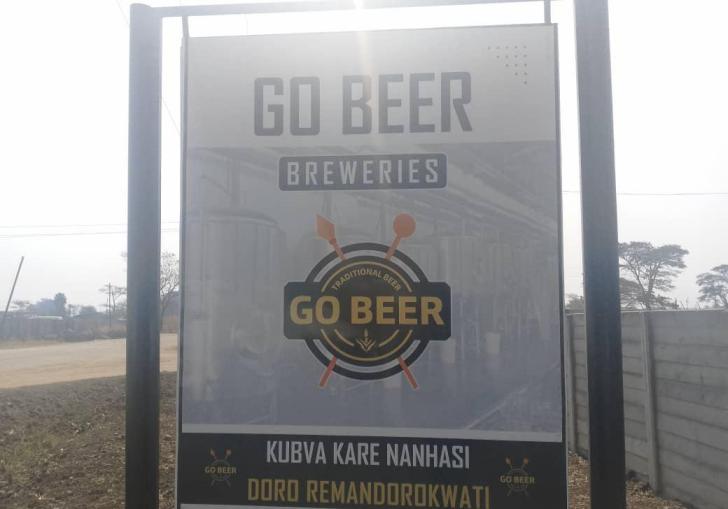News / National
Gweru's Go Beer bounces back after decade
01 Jan 2025 at 10:22hrs |
0 Views

Gweru City Council's beer concern, Go Beer, has reopened after a decade-long closure, bringing fresh hope to the local economy. The local authority confirmed that operations had resumed last week, with beer now being supplied to the Midlands market. Mayor Martin Chivhoko confirmed the development, highlighting the efforts taken to revitalize the brewery.
"After servicing existing equipment, repairing boilers, and acquiring a new automated machine for our 'shake shake' product, we are now back in business. Just before Christmas, people were already enjoying our beer," Chivhoko said.
The Go Beer revival is seen as a key driver for the rejuvenation of the brewery industry in Gweru and the broader Midlands region. According to the mayor, the resumption of operations will create jobs and stimulate economic growth.
"We have already recruited at least 50 employees, and all systems are fully operational. The National Social Security Authority has also inspected and approved our plant at the brewery," Chivhoko added.
The Gweru City Council partnered with Crest Street Industries to bring Go Beer back to life, with a brewing license now in place. Beer lovers in the Midlands capital have already seen the two-litre opaque Go Beer being sold at various outlets around the city.
In addition to the brewery's reopening, Chivhoko revealed that Go Beer Farm, a key part of the revitalization project, will supply raw materials for the brewery. The farm has dedicated 23 hectares to wheat production, which will not only support Go Beer's operations but also contribute to national food security.
"This year, we put 23 hectares for wheat production at Go Beer Farm. This project will provide essential raw materials for the brewery and contribute to the country's food security," the mayor said.
Go Beer's revival marks the end of several years of uncertainty for the company. Previous attempts to resuscitate the brewery had faltered, with a 2020 partnership with a "giant" opaque beer manufacturer collapsing. The brewery had closed in 2014 due to financial mismanagement, leaving the city's beer concern with a US$2.6 million debt.
At the time of its closure, Go Beer had failed to honor obligations to the Local Authorities Pension Fund, and municipal police and auditors launched investigations into the company's activities. However, no one has been held accountable for the alleged mismanagement to date.
In 2018, the city managed to pay packages to all retrenched workers, who had sued the council over unpaid salaries. The brewery had also lost equipment and cattle, which were attached to cover retrenchment costs.
Now, with Go Beer back in operation, the local authority is optimistic that the brewery will play a significant role in driving economic growth and job creation, as well as providing a boost to the Midlands capital's brewing industry.
"After servicing existing equipment, repairing boilers, and acquiring a new automated machine for our 'shake shake' product, we are now back in business. Just before Christmas, people were already enjoying our beer," Chivhoko said.
The Go Beer revival is seen as a key driver for the rejuvenation of the brewery industry in Gweru and the broader Midlands region. According to the mayor, the resumption of operations will create jobs and stimulate economic growth.
"We have already recruited at least 50 employees, and all systems are fully operational. The National Social Security Authority has also inspected and approved our plant at the brewery," Chivhoko added.
The Gweru City Council partnered with Crest Street Industries to bring Go Beer back to life, with a brewing license now in place. Beer lovers in the Midlands capital have already seen the two-litre opaque Go Beer being sold at various outlets around the city.
"This year, we put 23 hectares for wheat production at Go Beer Farm. This project will provide essential raw materials for the brewery and contribute to the country's food security," the mayor said.
Go Beer's revival marks the end of several years of uncertainty for the company. Previous attempts to resuscitate the brewery had faltered, with a 2020 partnership with a "giant" opaque beer manufacturer collapsing. The brewery had closed in 2014 due to financial mismanagement, leaving the city's beer concern with a US$2.6 million debt.
At the time of its closure, Go Beer had failed to honor obligations to the Local Authorities Pension Fund, and municipal police and auditors launched investigations into the company's activities. However, no one has been held accountable for the alleged mismanagement to date.
In 2018, the city managed to pay packages to all retrenched workers, who had sued the council over unpaid salaries. The brewery had also lost equipment and cattle, which were attached to cover retrenchment costs.
Now, with Go Beer back in operation, the local authority is optimistic that the brewery will play a significant role in driving economic growth and job creation, as well as providing a boost to the Midlands capital's brewing industry.
Source - the standard
Join the discussion
Loading comments…





































